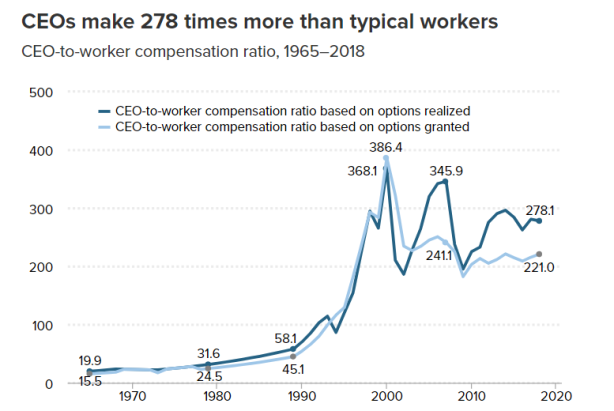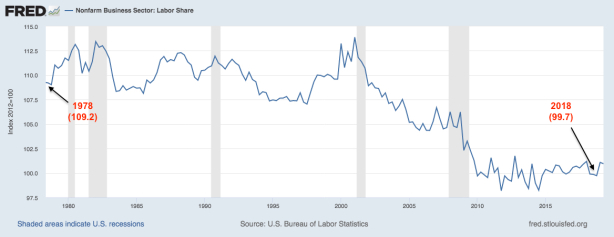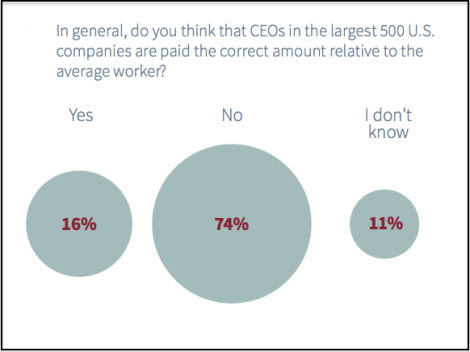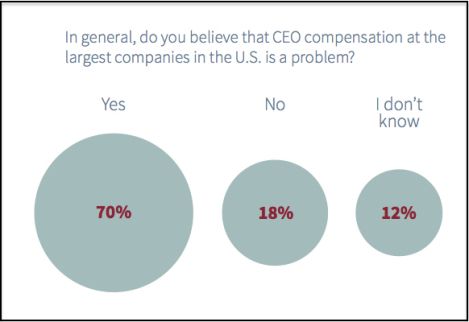From David Ruccio American capitalism is coming apart at the seams. Truth be told, it’s been coming apart for decades now—and that trend has only continued during the recovery from the worst crash since the 1930s. A good indicator of the shredding of the U.S. economic and social fabric is the difference in the level of compensation of Chief Executive Officers of major American corporations compared to that of the average worker. While they labor, workers create value, some of which they receive back in the form of compensation; the rest of what they produce is the surplus, which is appropriated by the boards of directors of the enterprises that hire the workers. The boards also hire CEOs, to supervise the production of the surplus, who in turn get a cut of the surplus. In other
Topics:
David F. Ruccio considers the following as important: Uncategorized
This could be interesting, too:
tom writes The Ukraine war and Europe’s deepening march of folly
Stavros Mavroudeas writes CfP of Marxist Macroeconomic Modelling workgroup – 18th WAPE Forum, Istanbul August 6-8, 2025
Lars Pålsson Syll writes The pretence-of-knowledge syndrome
Dean Baker writes Crypto and Donald Trump’s strategic baseball card reserve
from David Ruccio
American capitalism is coming apart at the seams.
Truth be told, it’s been coming apart for decades now—and that trend has only continued during the recovery from the worst crash since the 1930s.
A good indicator of the shredding of the U.S. economic and social fabric is the difference in the level of compensation of Chief Executive Officers of major American corporations compared to that of the average worker. While they labor, workers create value, some of which they receive back in the form of compensation; the rest of what they produce is the surplus, which is appropriated by the boards of directors of the enterprises that hire the workers. The boards also hire CEOs, to supervise the production of the surplus, who in turn get a cut of the surplus. In other words, the executives share in the booty created by the workers they supervise. Thus, both groups—CEOs and workers—perform labor and are compensated for their work but the source and level of their compensation couldn’t be more different.
According to the Economic Policy Institute, in 2018, average compensation (including realized capital gains) of CEOs at the top 350 American firms was $17.2 million. And for workers? It was only $56 thousand. As a result, the ratio of CEO compensation to that of workers was an astounding 278.1 to 1! In 1978, that ratio stood at 29.7 to 1. The spectacular growth in the CEO-to-average-worker-compensation ratio reflects the fact that, over that same period, CEO compensation has risen 940.3 percent while that of workers has grown only 11.9 percent.
Just in the past nine years of the so-called recovery, CEO compensation far outpaced that of workers: 52.6 percent compared to only 12.7 percent.
It should come as no surprise, then, that over the 1978-2018 period, the labor share of national income has dropped precipitously, by 8.7 percent (falling 2.1 percent just since 2009). Corporate CEOs have thus done their job—extracting more surplus from workers—and been rewarded handsomely for their efforts.
And Americans are quite aware of how unfair the U.S. corporate economy has become.
According to a 2016 survey conducted by , , and
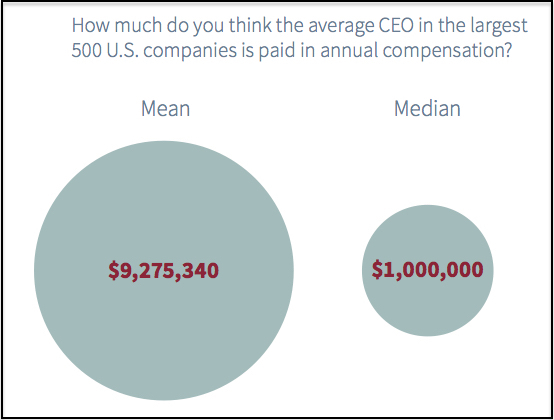
And that’s even when Americans grossly underestimate the amount of the surplus corporate CEOs manage to capture. The typical American believes a CEO earns $1 million in pay (with an average of $9.3 million), whereas median reported compensation for the CEOs of these companies was approximately $10.3 million (with an average of $12.2 million).
In other words, CEO compensation figures are much higher than the public is aware of, and for many Americans it is simply incomprehensible that anyone can earn that much money.
Moreover, Americans are not convinced corporate CEOs should be able to capture as much of the surplus as they do. For example, according to the same survey, when respondents are given a hypothetical situation in which a company’s value increases by $100 million over the course of a year, the median respondent believes that the CEO should receive only 0.5 percent ($500,000) as compensation. In other words, as Donatiello put it, “Either the public is not sold on the idea that CEOs should share in value creation to the extent that they do. Or they do not believe that CEOs play an important role in value creation.”
Clearly, the high level of exploitation—and the subsequent distribution of a large portion of the resulting surplus to CEOs—is the source of the rending of the U.S. economic and social fabric. Unless corporations are fundamentally transformed, so that workers and society as a whole have a say in the size and distribution of the surplus, American capitalism will continue to come apart at the seams.

